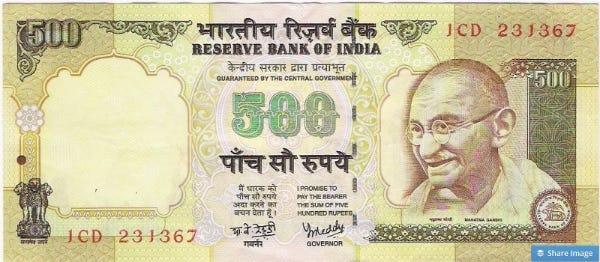Looking for money: newsletter #12

Access to Capital
What is cash? My economist friends will have their own answers, but as far as laypeople go, cash is what allows you to buy stuff. Cash goes in, stuff comes out. Cognitively, cash is tied to property. If possession is nine-tenths of the law, and you need cash in order to possess, then cash is at least nine tenth's of the law. Get your own bag, as the famous Lay's advertisement said.
That's so twentieth century. Cash is no longer about possession. It's about access. The clearest demonstration of this inversion is in the evolution of people's bodies over the last thirty years. When I was a child, rich people were fat and poor people were thin. The term "healthy" (hear it in your inner ear with a thick North Indian accent) meant plump. A well-rounded individual, so to speak. Now it's the opposite. Rich people are thin: they eat organic food, exercise in gyms and take vacations in the Himalayas. Poor people eat junk food, work behind a counter and take no vacations. Then, as now, body mass is a sure sign of wealth. It's just turned upside down: when wealth was about possession, rich people possessed a lot of fat. Now, they hanker after experiences - the luxury float at Burning Man, the junket at TED or at Davos, the evening spent with the Dalai Lama and so on. Let's call it access capital(ism).
There are huge economic consequences to this shift toward access, but I am not going to dwell on them. Instead, let me point out what access capital does for our personal lives. In the earlier era, the slogan was "money can't buy me love;" which is true, for love doesn't lend itself easily to possession, but in the age of money as access, love is exactly one of the things that can be bought. The data bear me out: in the US, not only are the rich thinner and better looking, they are much less likely to divorce. It's not a matter of keeping the family property - women in the upper middle class have much more financial freedom than they ever had. They are staying together for love. Love can be bought with access capital because money now means more experiences, more education, more smarts, more networks - in other words, all the things that make people interesting and worth falling in love.
Conversely, poverty is not only bone-crushing, it's also soul-numbing. The new inequalities we are creating are likely to be much deeper than any of the last hundred years; they will be genetic as much as social. Both nature and nurture will conspire against the poor.
Access capitalism is fundamentally tied to information and knowledge. The easiest way to ensure access is to wire our brains to become more access seeking. That's a what a good education does. A rich person has a sixteen year access advantage on a poor person by the time they get to the workforce, starting with the grossest measures such as the number of words they hear before their brains mature. If we care to tackle the 1% as a society, we have to invest massively in systemic tools for expanding people's minds.
This week's links
Access to knowledge is going to be a key battleground over the coming decades; it's no surprise that journal publishers are among the worst offenders. Here's a great article about the IIT-KGP guy who built google scholar and has chosen a lower profile path at google as a result.
If one way to prevent access is to put it behind a paywall, another way to prevent access is stop people with knowledge from moving to other locations. It turns out that companies are doing that in a big way now. If immigration laws are the bane of blue collar society, non-compete laws will be the bane of the knowledge society. It's not about moving in physical space alone; it's about movement in mental space as well.
Meanwhile, our schools are stuck with laughably outdated ideas about education.


